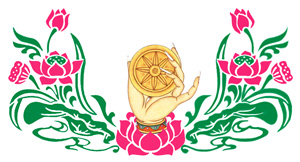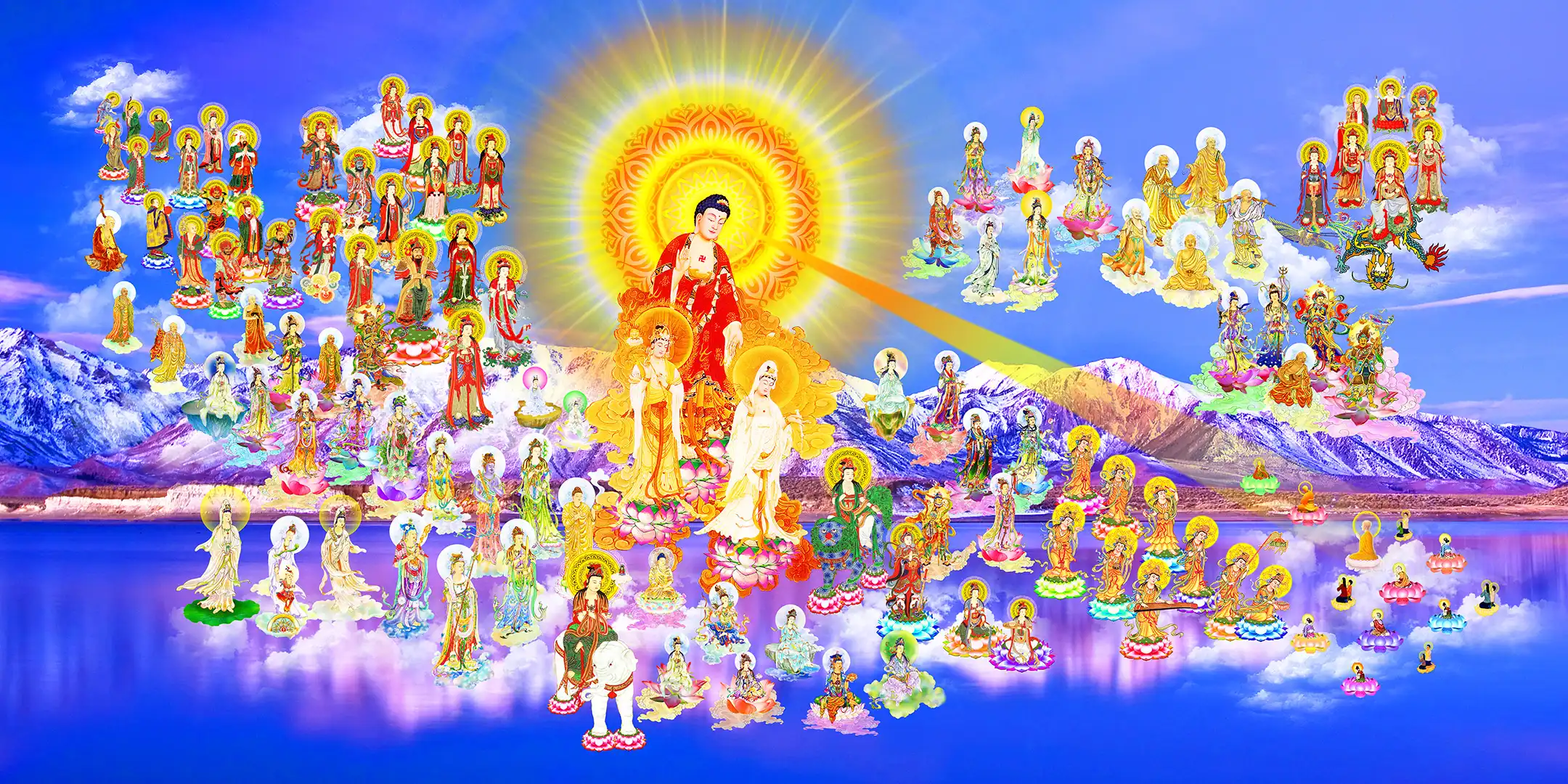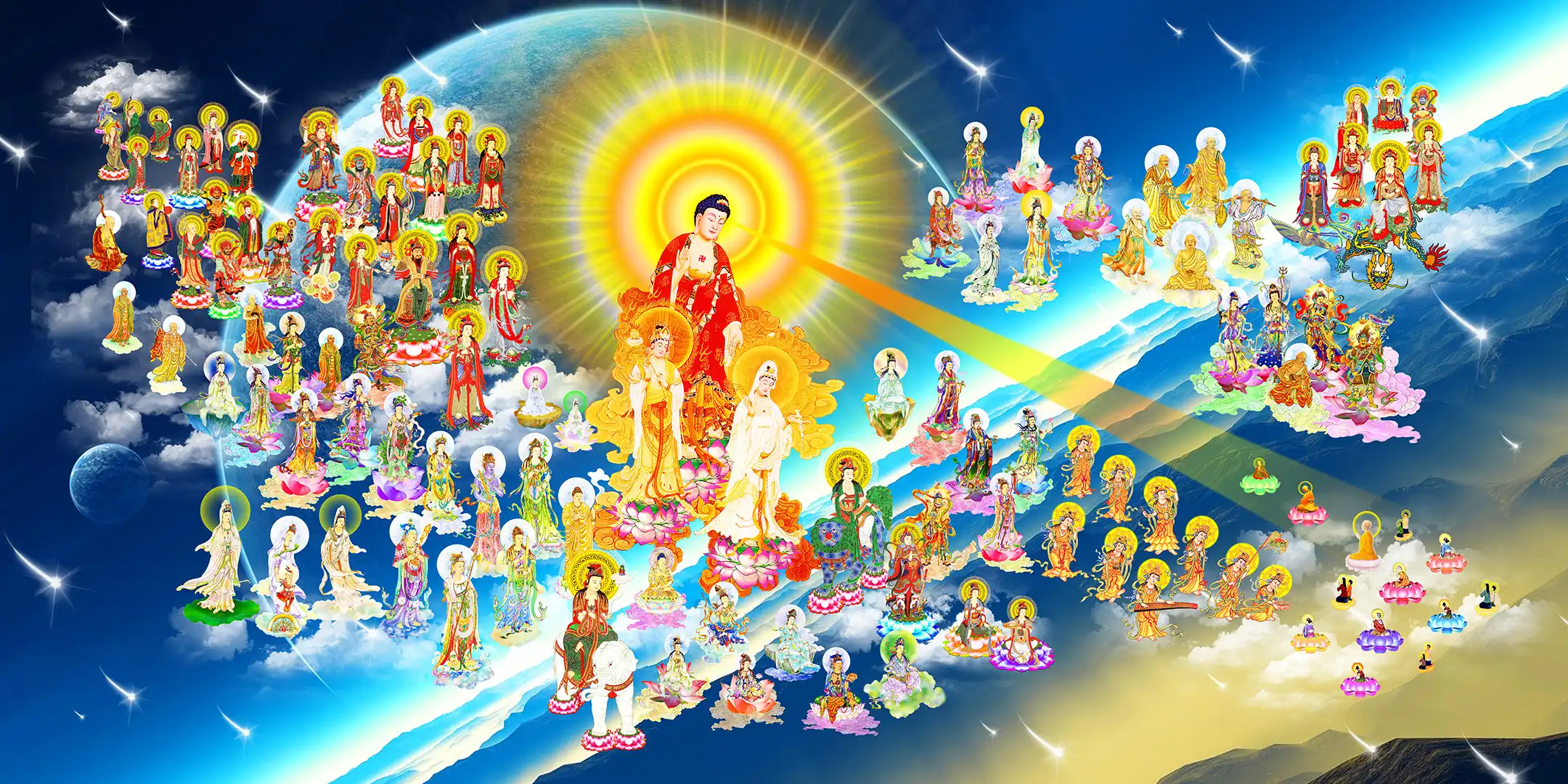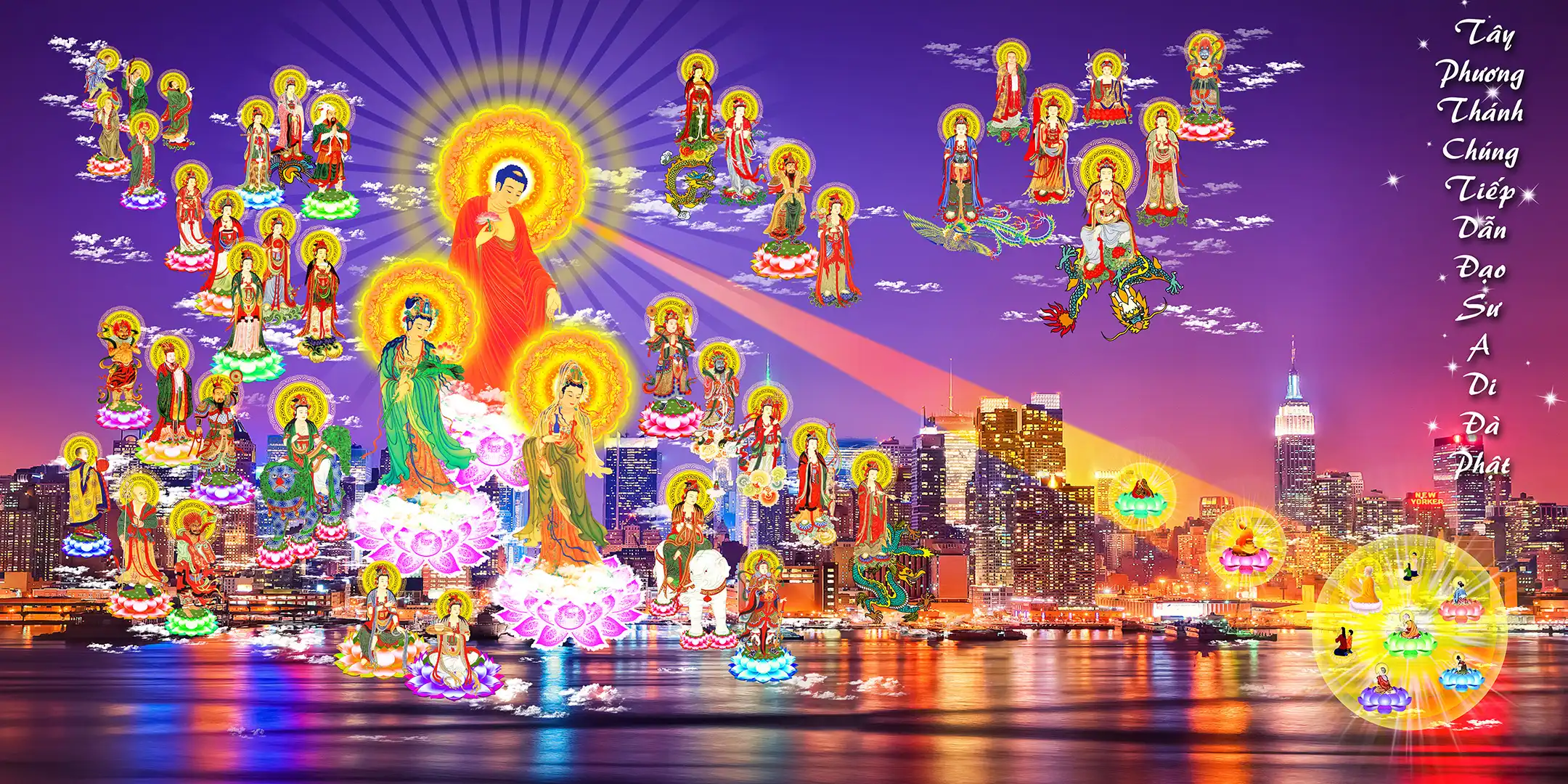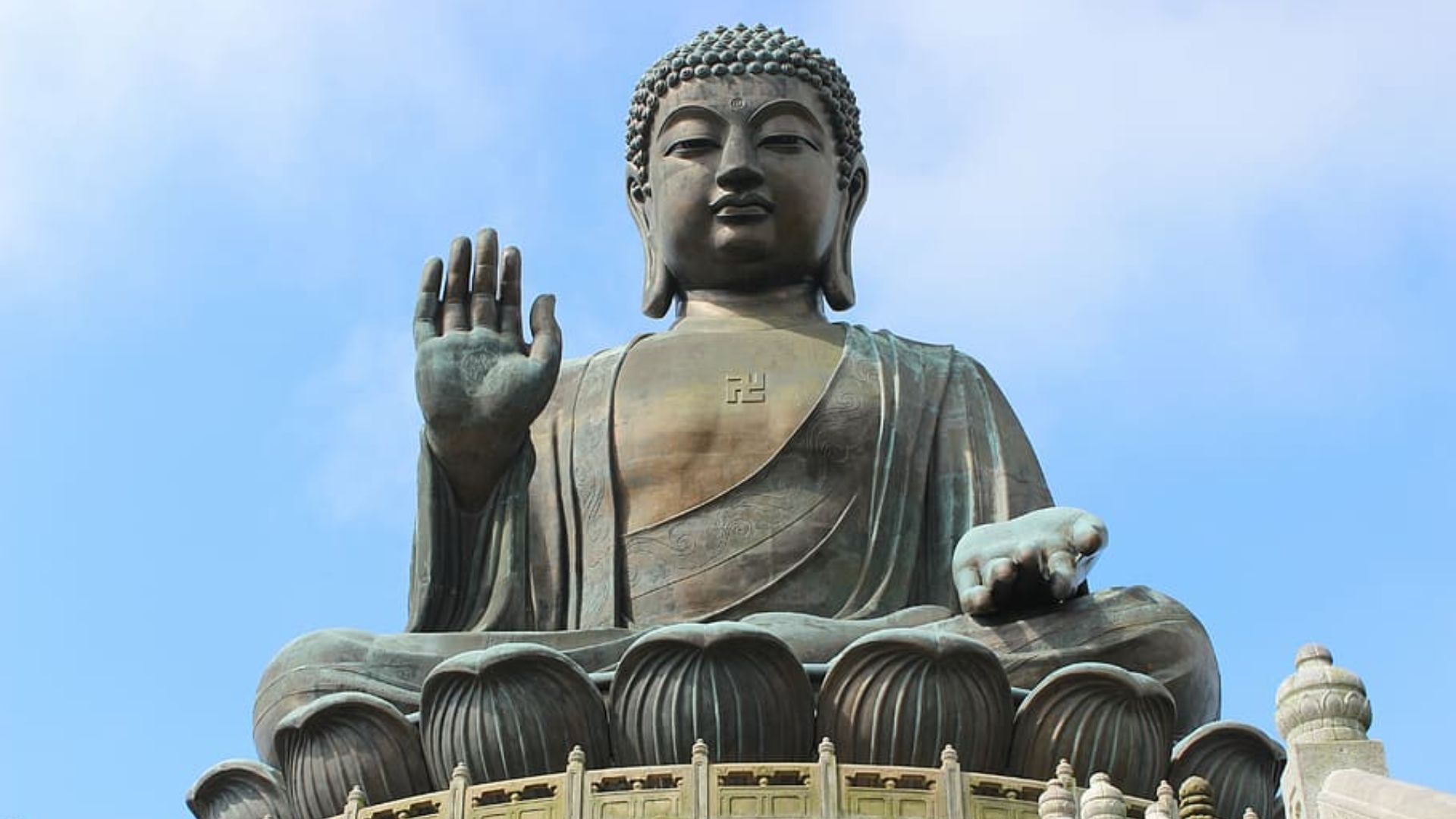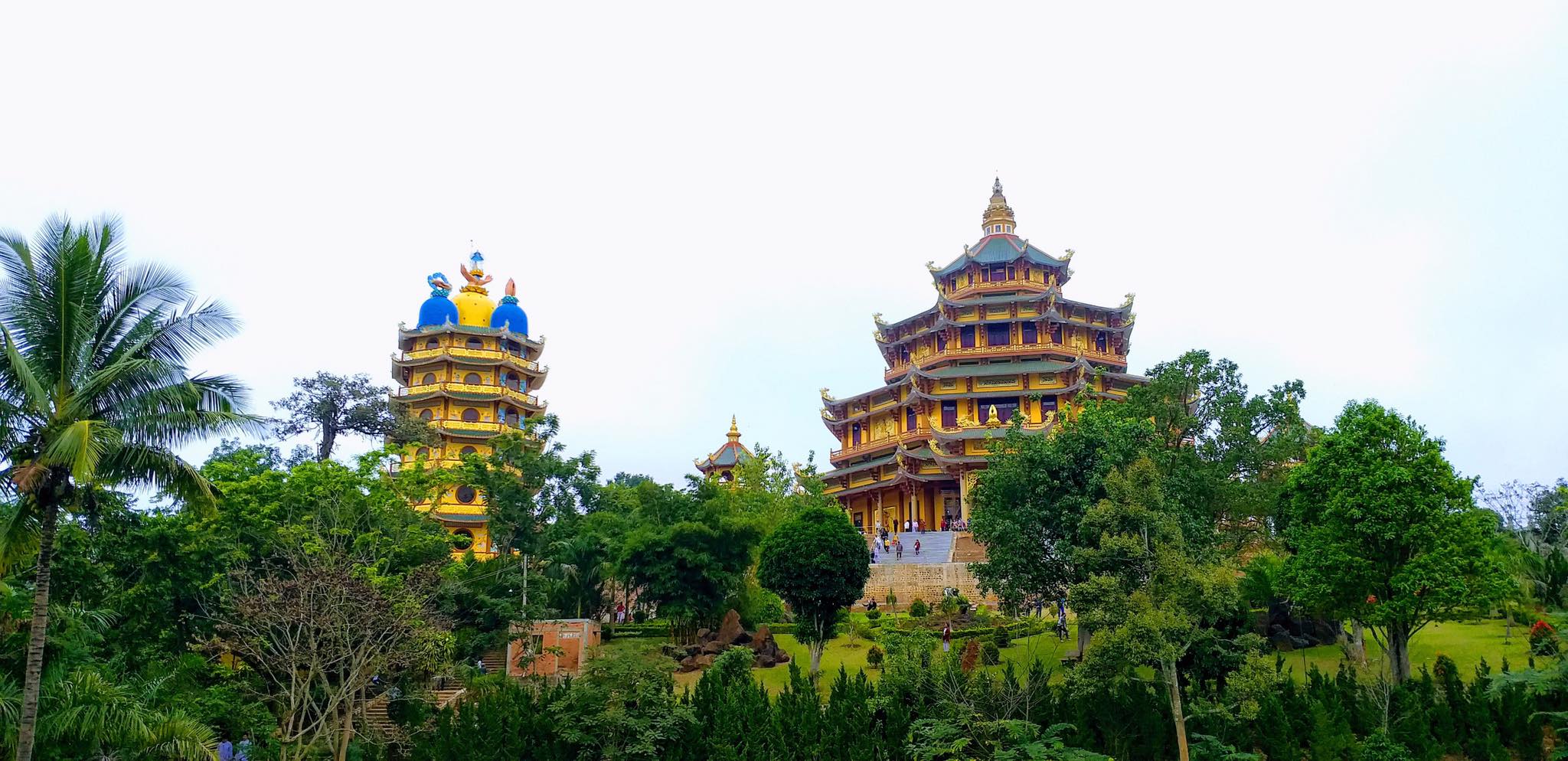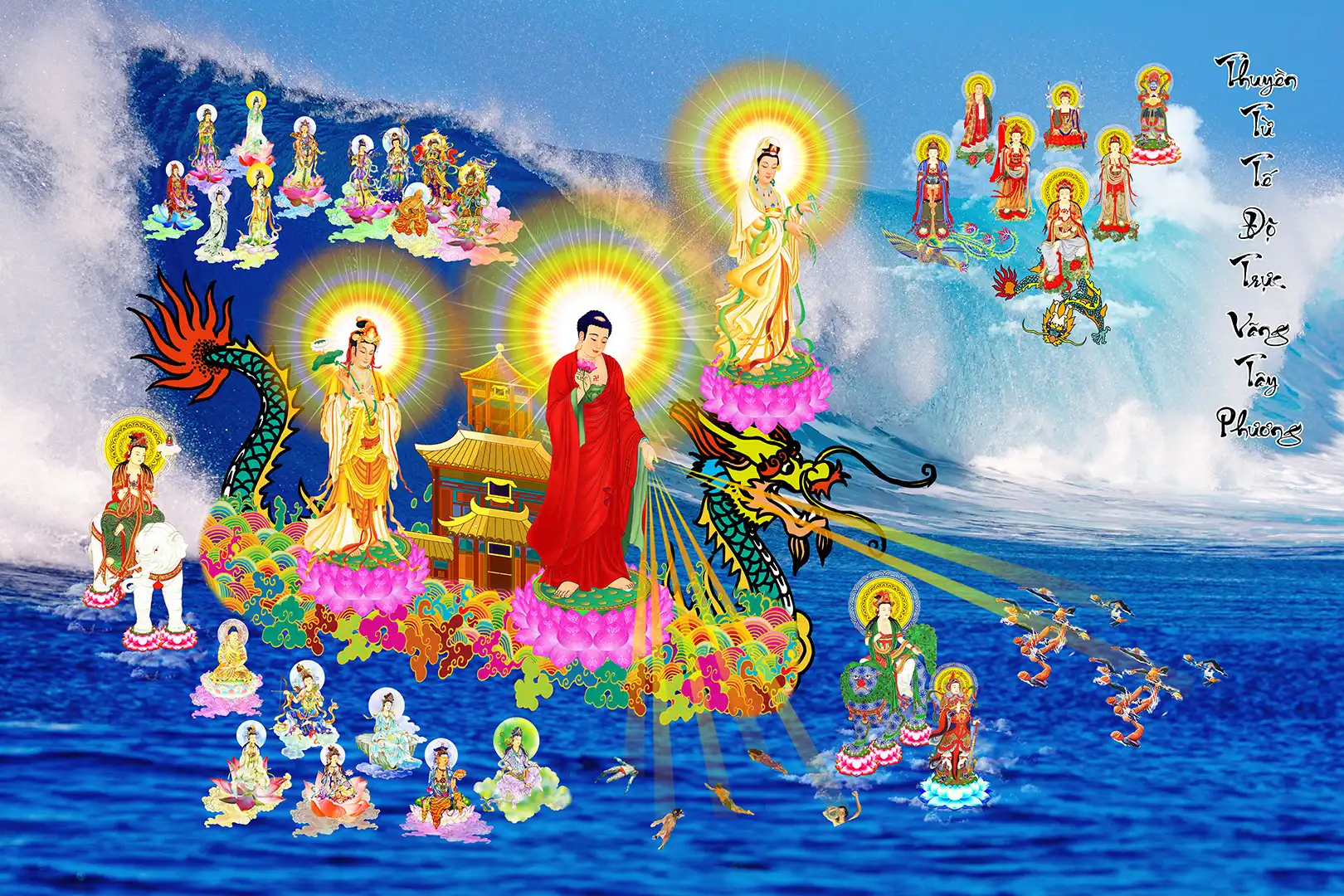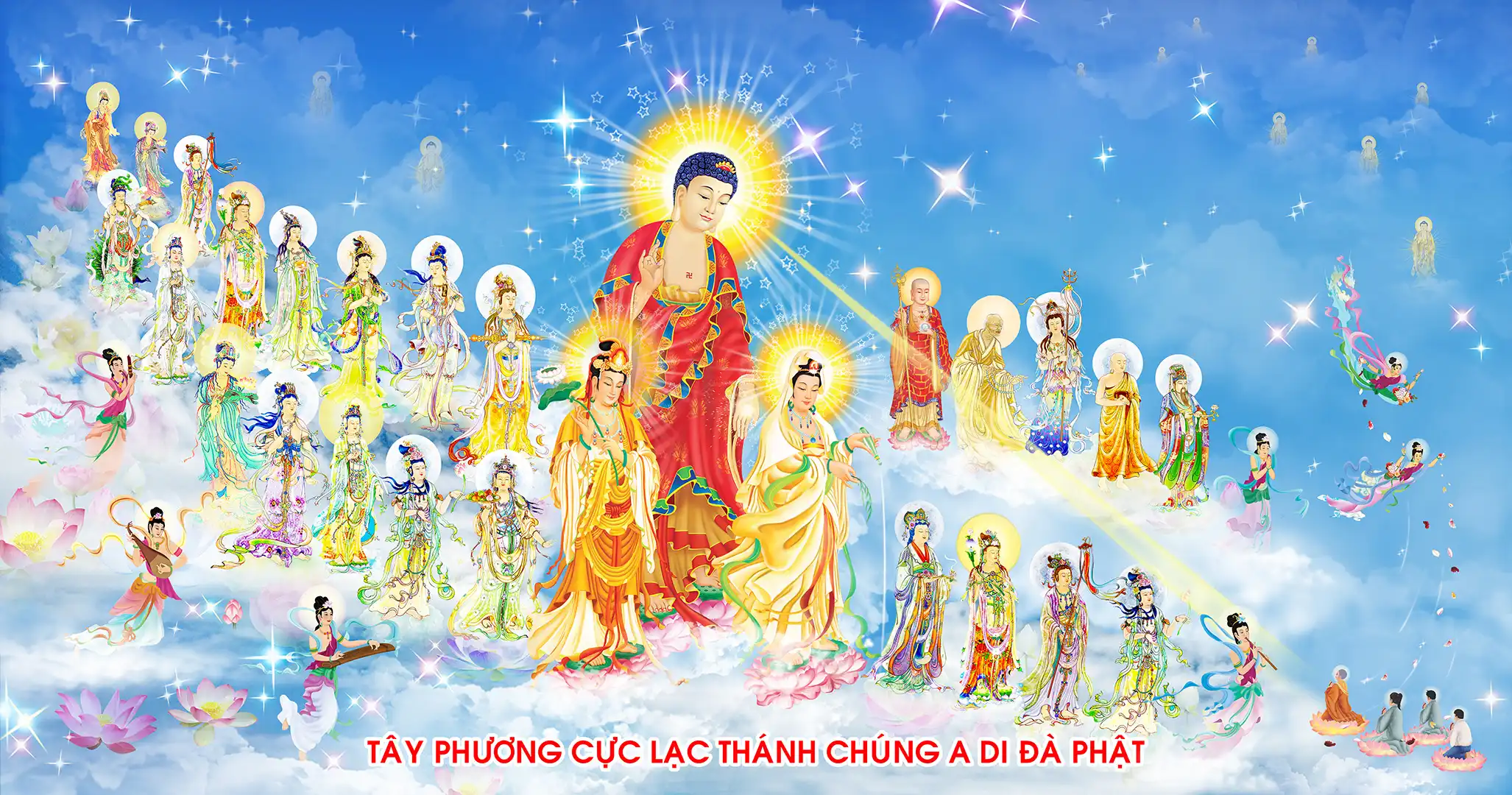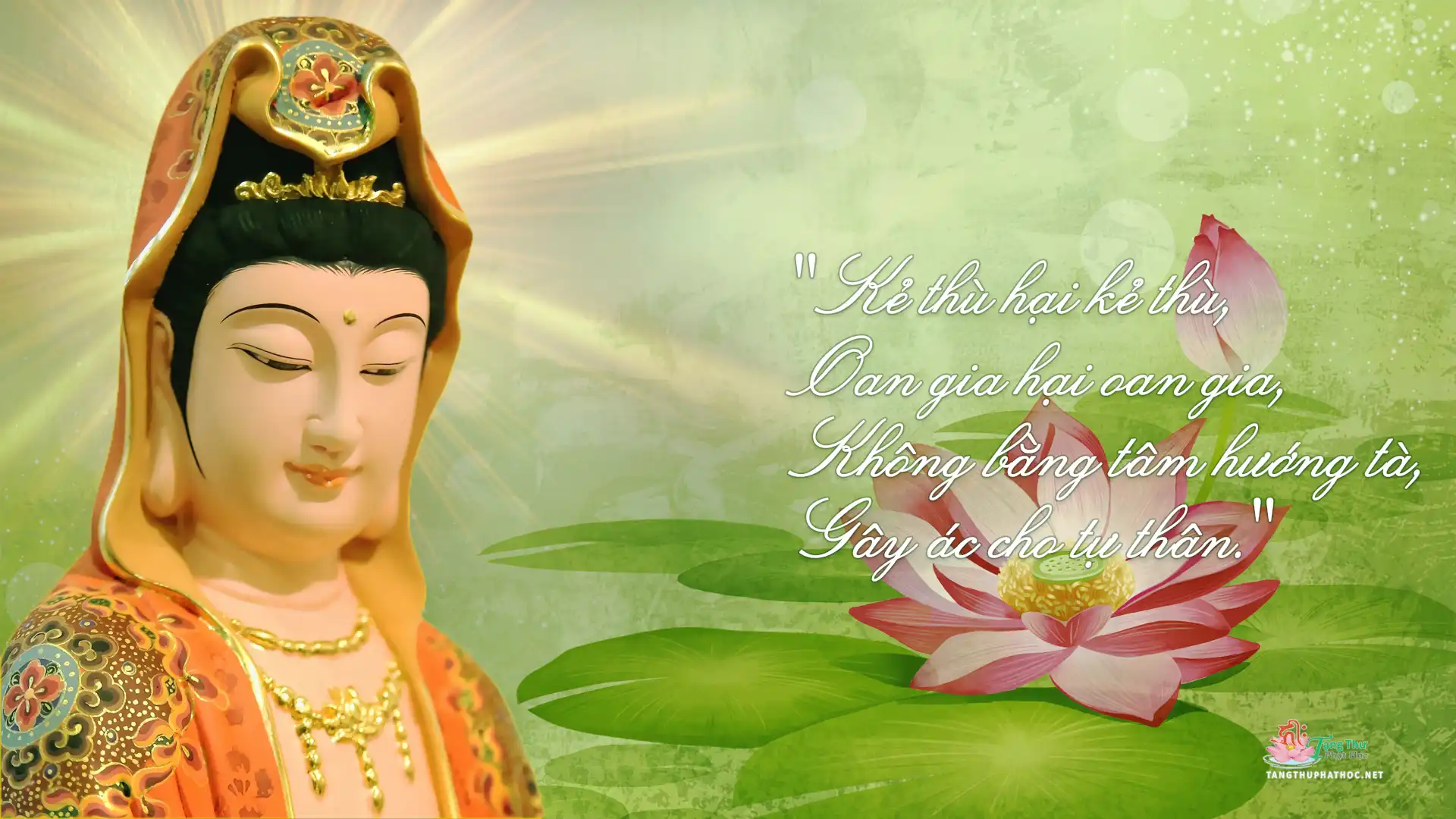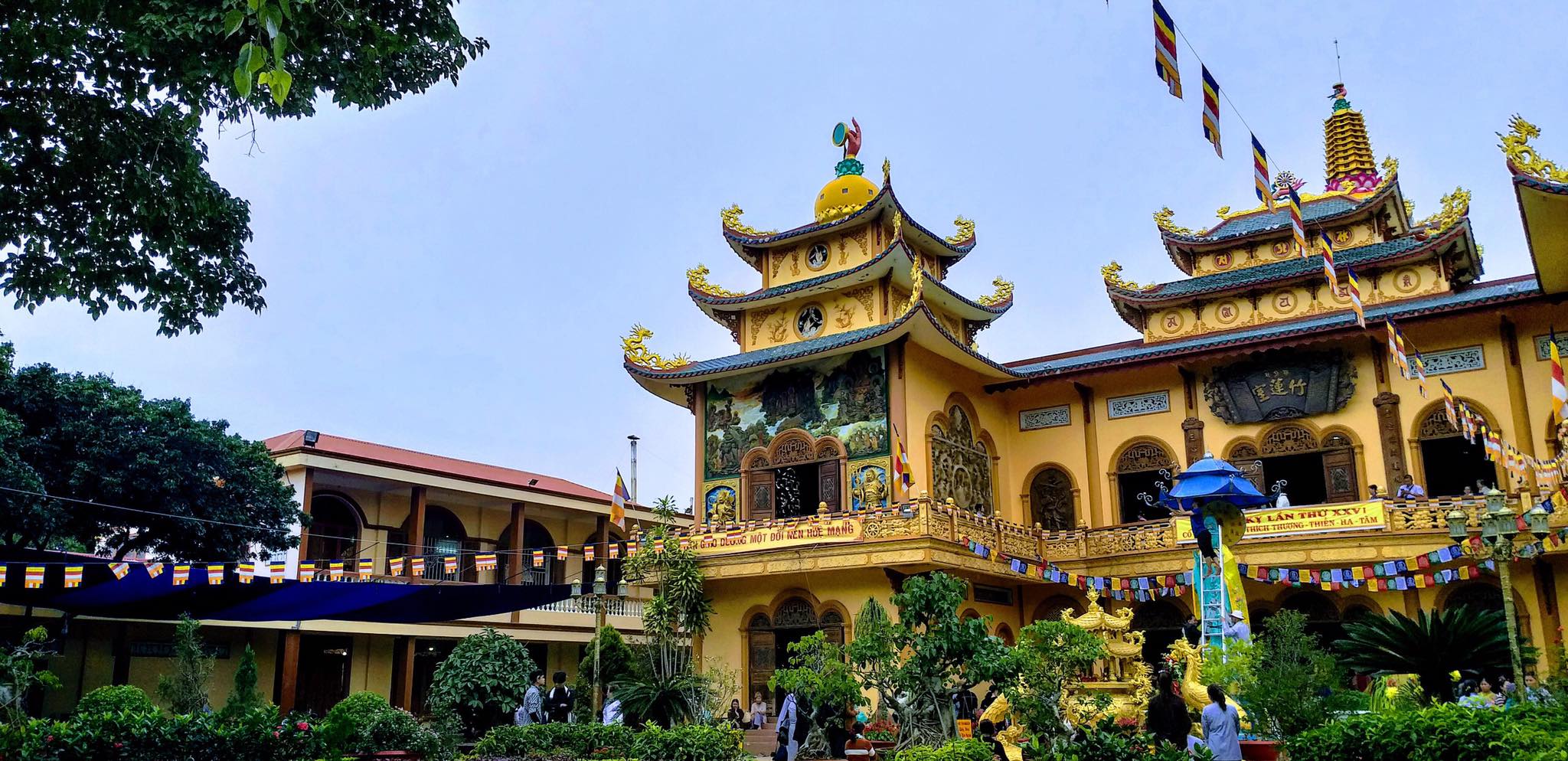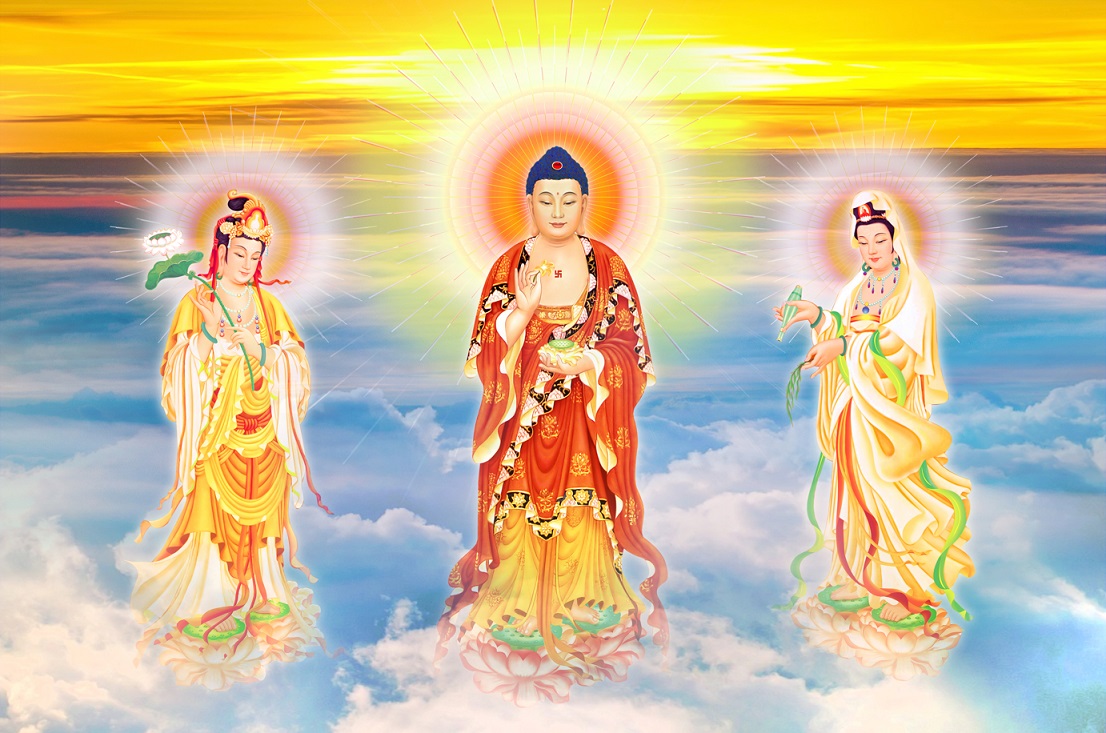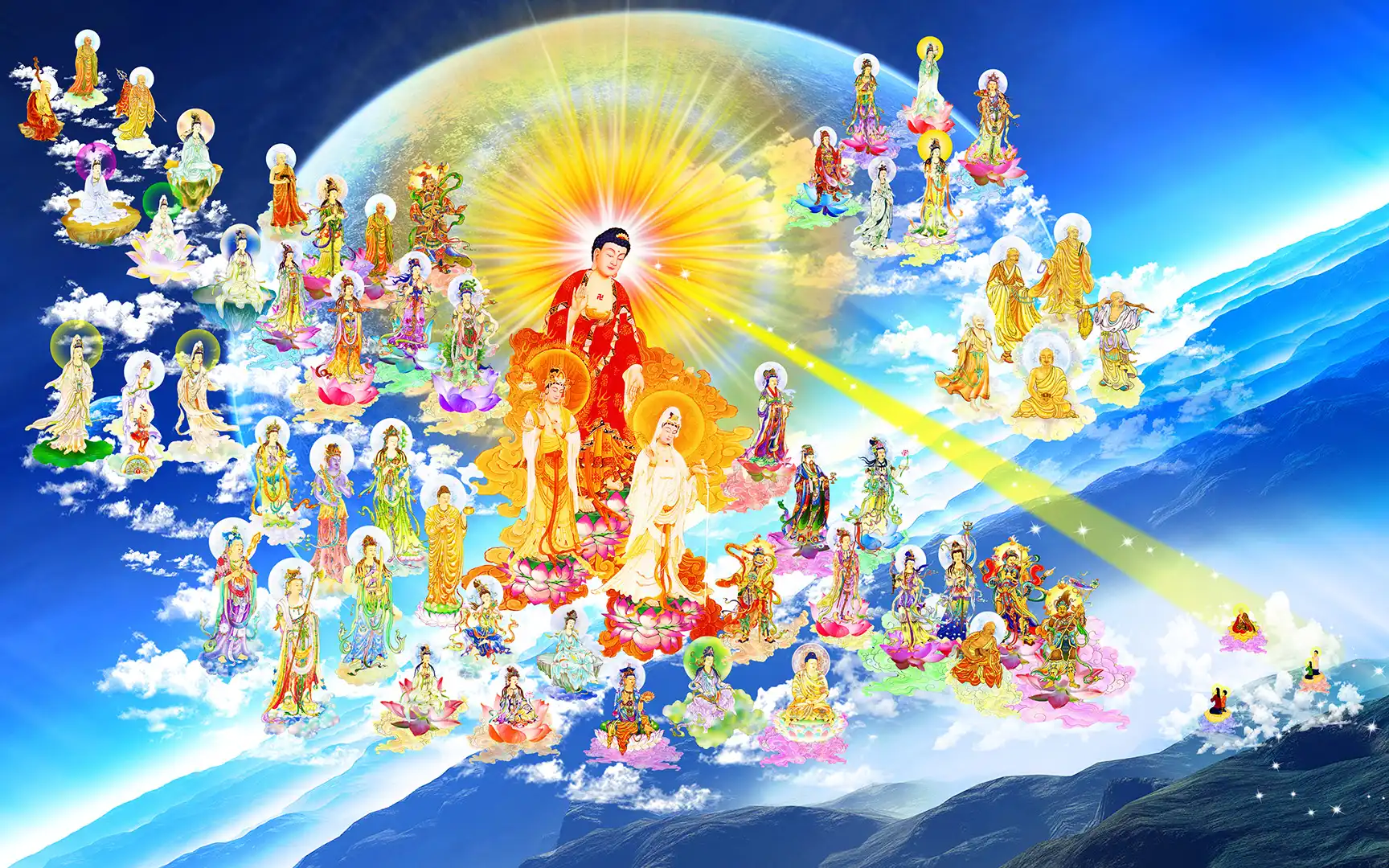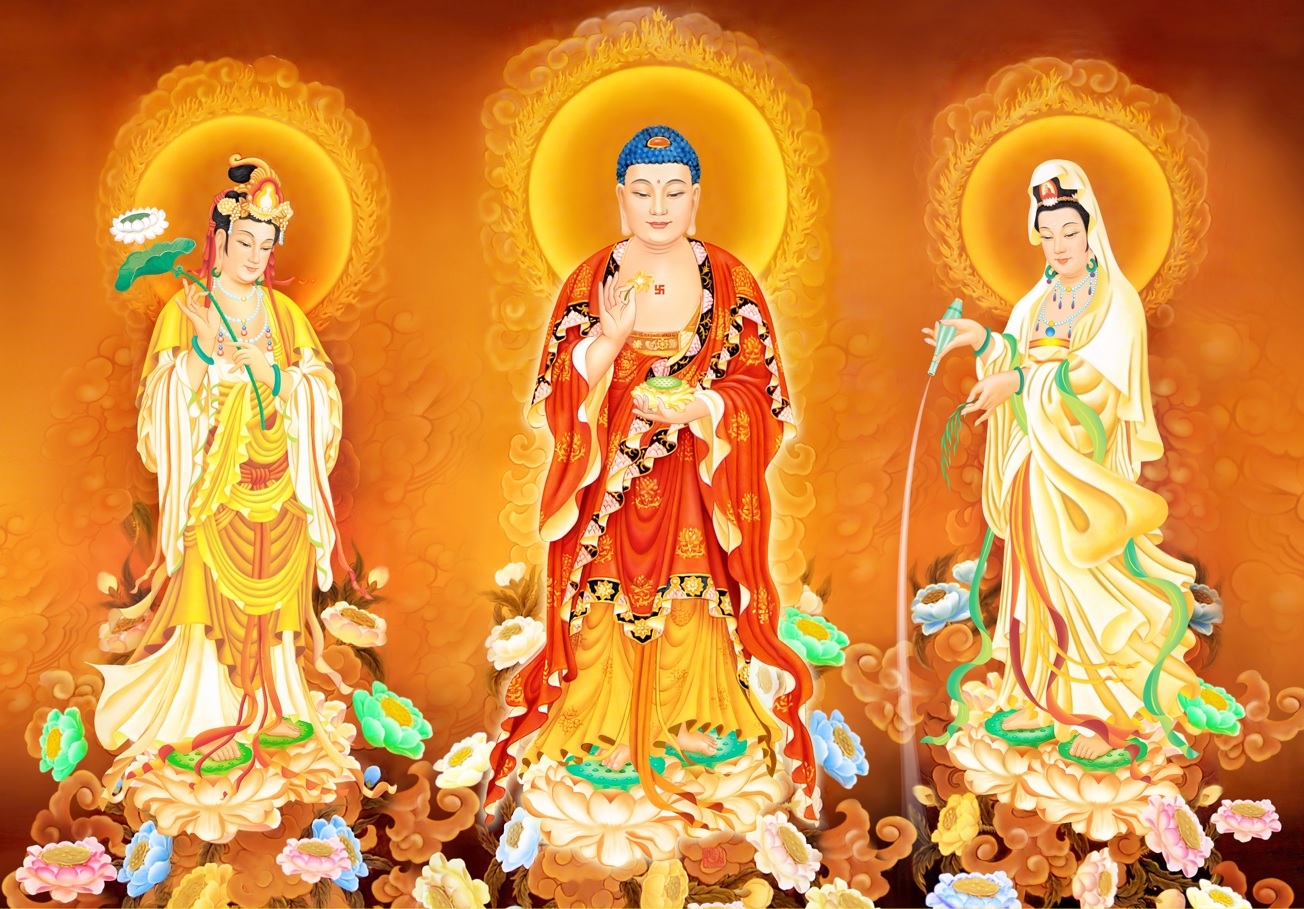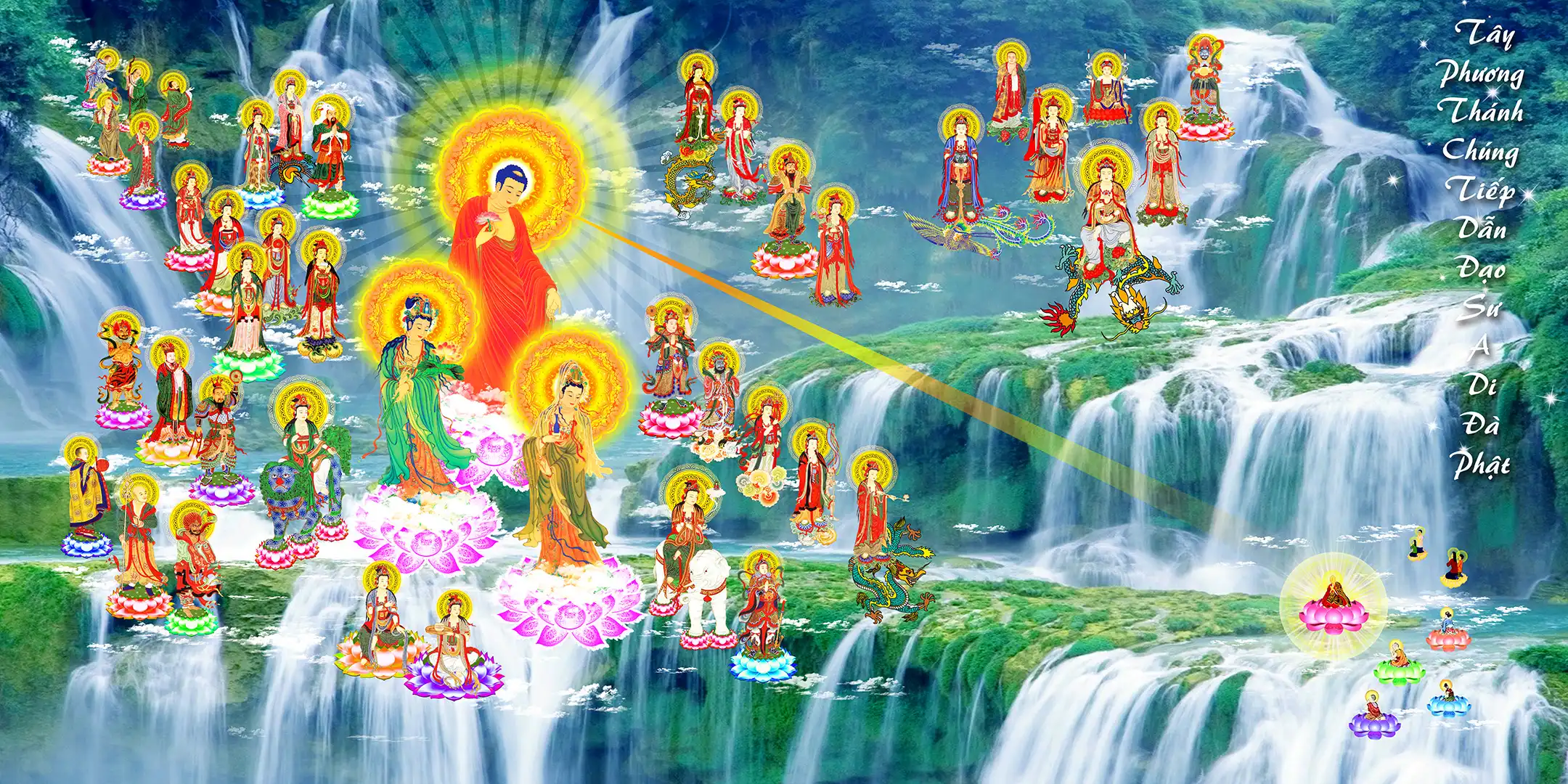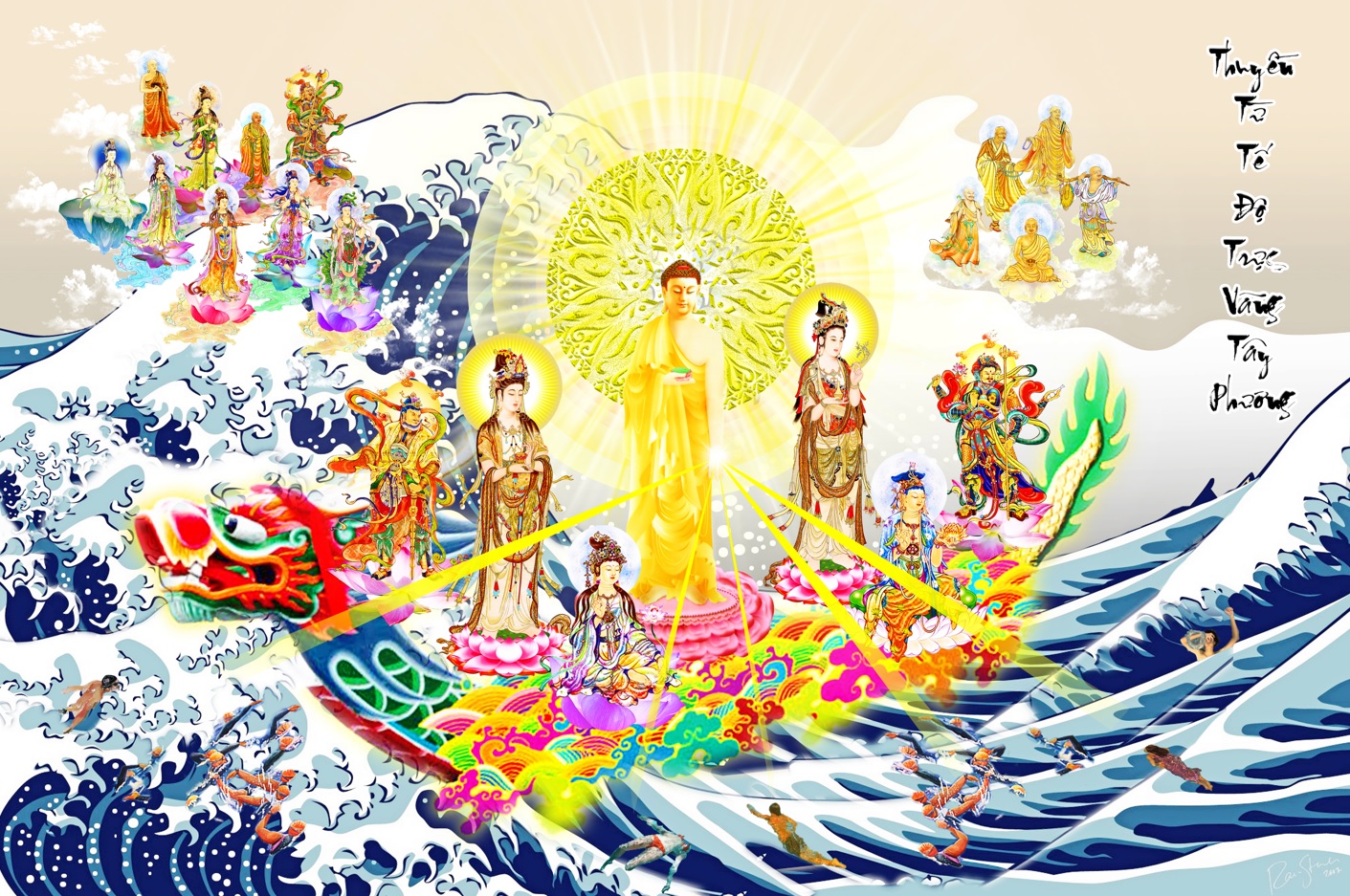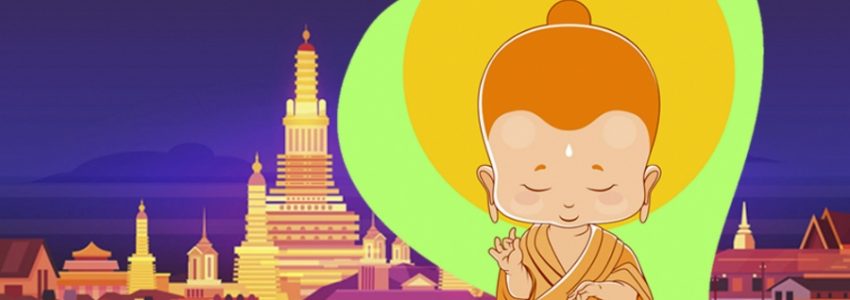THE SORROWLESS FLOWERS
Thiện Phúc
VOLUME I
51. Hungry Ghosts
52. Animals
53. War Gods (Asuras)
54. Human Beings
55. Man’s Virtue in Confucianism
56. Man’s Place in Religions
57. Material Components of a Human Being
58. Spiritual Elements of a Human Being
59. It’s Difficult to Be Reborn as a Human Being
60. Four Types of People
![]()
51. Hungry Ghosts
Think as follows: “At this time, I have not been reborn in hell, but if I were born a hungry ghost I would be so tormented by intolerable sufferings, heat, cold, hunger, thirst, exhaustion and fear. The place of hungry ghost rebirths has absolutely no grass, trees, or water; the whole ground is desolate as if scorched by the sun. The bodies and limbs of hungry ghosts are most ungainly. Their heads and faces are wrinkled, and their necks extremely thin and unable to support their heads. They have huge bodies and an uneven number of legs and arms, which are as thin as stalks and unable to support them. They have a hundred times or a thousand times more difficulty in walking than old people do in our human realm. Starved ghosts realm where greedy, selfish and deceitful souls are reborn. In the path of hungry ghosts, beings have ugly, smelly bodies, with bellies as big as drums and throats as small as needles, while flames shoot out of their mouths. They are subject to hunger and thirst for incalculable eons. According to the Buddhism doctrine, envy, greed, and jealousy are factors lead to rebirth as a hungry ghost. Hungry ghosts suffer torment of hunger because their bellies are immense but their mouths only as small as a needle. Besides, they are also subject to various other tortures, because when they try to put food into their mouth, it appears to them to be fire, or pus, or blood, etc. However, the Ten Dharma Realms are not apart from a single thought. This one thought creates the Ten Dharma realms or all is created from the present thought of the mind. By doing hellish things, you will fall into the hells. By acting like a ghost, you fall into the realm of ghosts; by acting like a human being, you can become a person; by behaving as an asura, you are reborn in the realm of asuras. If you do the deeds of Arhats, you join the ranks of Arhats. If you do the work of Bodhisattvas, you become part of the retinue of Bodhisttvas. If you perform the deeds of Buddhas, then you will become a Buddha. So this is all created from the present thought of your mind. Naturally speaking, if you plant good causes, you will receive good effects. If you plant bad causes you will receive bad effects. If you plant melons you will get melons; if you plant beans you will get beans. However, on the contrary, ghosts are so deluded about causes and effects, they plant eggplant in the hope of harvesting beans, or plant hot pepper and anticipate harvesting cucumbers.
The Sanscrit term “Preta” means hungry spirits, which is one of the three lower destinies. They are also called needle-mouth ghosts, with mouths so small that they cannot satisfy their hunger or thirst. They are of varied classes, and are in differing degrees and kinds of suffering, some wealthy and light torment, others possessing nothing and in perpetual torment; some are jailers and executioners of Yama in the hells, others wander to and fro amongst men, especially at night. According to Bikkhu Khantipalo, “Hungry” means experiencing constantly unsatisfied cravings, and preta is a kind of being which is below man in the spiritual scale. With greed, sentient beings some to the state of pretas. Think of people whose attachments to money and material possessions are very strong. The misers of this world are those who rejoice in having more, better and bigger things than other people. Such people are developing factors of mind which if they persist in them, will lead them to uprise among these hungry ghosts.
According to Buddhism, ordinary love (Dục ái) or desire as eager as that of a hungry ghost, in contrast with Religious love or Bodhisattva love with desire to save all creatures; while the destiny of the hungry ghosts, one of the six paths. Hungry ghosts have three characteristics: ravenous beings with distended bellies and tiny throats; ghosts are masses of “negative” energy which have shadow and no form, or form and no shadow; ghosts like to hate. Hungry ghosts like to vent their tempers and get angry. If they are treated well, they get mad. If they are treated badly, they also get mad. They like to give people troubles. The state of hungry ghosts. Starved ghosts realm where greedy, selfish and deceitful souls are reborn. In the path of hungry ghosts, beings have ugly, smelly bodies, with bellies as big as drums and throats as small as needles, while flames shoot out of their mouths. They are subject to hunger and thirst for incalculable eons. If it was greed to be arrogant that made the person commit offenses, then after he has finished paying for his crimes, he takes shape when he encounters gases, and he is called a Hungry Ghost. Ghosts are always deluded by effects, but confused about the cause. It is to say ghosts are not clear about the effects, and they do not understand the causes. They cannot tell the difference between good and bad. According to Buddhism, if we plant good causes, we will receive good effects. If we plant bad causes, we will receive bad effects. If we plant cucumbers we will receive cucumbers; if we plant beans, we will receive beans. However, hungry ghosts do not understand about the theories of causes and effects. They either plant hot peppers and anticipate receiving oranges; or they plant eggplant and anticipate receiving beans. They are totally deluded by effects and confused about causes. The more they have ignorance and upside-down views, the more ignorance they accumulate, the more offenses they commit, and the more karma they create.
According to Mahayana Buddhist tradition, there are nine classes of ghosts: burning torch-like ghost; Narrow needle-mouth ghosts; Stinking mouth ghosts; Needle-like hair ghosts, self-piercing; Hair-sharp and stinking, or stinking hair ghosts; Ghosts of which bodies are full of tumours; Ghosts that haunt sacrifices to the dead; Ghosts that eat human leavings, which live on the remains of sacrifices, or any leavings in general; Rich ghosts, or powerful demons, i.e. yaksas, raksasas, picasas, etc., belong to the realm of Yama whence they are sent everywhere, consequently are ubiquitous in every house, lane, market, mound, stream, tree, etc. According to The Surangama Sutra, the Buddha reminded Ananda as follows: “Ananda! After the living beings who have slandered and destroyed rules and deportment, violated the Bodhisattva precepts, slandered the Buddha’s Nirvana, and created various other kinds of karma, pass through many kalpas of being burned in the inferno, they finally finish paying for their offenses and are reborn as ghosts. Who was greed for lust that made the person commit offenses, then, after he has finished paying for his crimes, he takes shape when he encounters the wind, and he is called a drought-ghost. Who was greed to lie that made the person commit offenses, after he has finished paying for his crimes, he takes shape when he encounters an animal, and he is called a Mei-Ghost. Who was greed for hatred that made the person commit offenses, then, after he has finished paying for his crimes, then, after he has finished paying for his crimes, he takes shape when he encounters worms, and he is called a Ku-Poison Ghost. Who was greed for animosity that made the person commit offenses, then, after he has finished paying for his crimes, he takes shape when he encounters degeneration, and he is called a Pestilence Ghost. Who was greed to be arrogant that made the person commit offenses, then after he has finished paying for his crimes, he takes shape when he encounters gases, and he is called a Hungry Ghost. Who was greed to be unjust to others that made the person commit offenses, then after he has finished paying for his crimes, he takes shape when he encounters darkness, and he is called a Paralysis Ghost. Who was greed for views that made the person commit offenses, then, after he has finished paying for his crimes, he takes shape when he encounters essential energy, and he is called a Wang-Liang Ghost. Who was greed for deception that made the person commit offenses, then, after he has finished paying for his crimes, he takes shape when he encounters brightness, and he is called a Servant Ghost. Who was greed to be litigious that made the person commit offenses, then, after he has finished paying for his crimes, he takes shape when he encounters people, and he is called a Messenger Ghost.
Also according to the Surangama Sutra, book Eight, the Buddha taught Ananda about ten kinds of ghosts that will be reborn as an animal to continue to pay their debts as follows: “Ananda! When his karma as a ghost is ended, the problem of emotion as opposed to discursive thought is resolved. At that point he must pay back in kind what he borrowed from others to resolve those grievances. He is born into the body of an animal to repay his debts from past lives. These ten kinds of ghosts include: 1) The strange Ghost, whose retribution of material objects is finished when the object is destroyed and it is reborn in the world, usually as a species of owl (after expiating their misdeeds in their realms, are mostly reborn as owls). If the craving be the cause of their misdeeds, they will, after paying for their sins, take the form of whatever they meet on living the Hells. 2) The drought ghost, whose retribution of the drought ghost of the wind is finished when the wind subsides, and it is reborn in the world, usually as a species of weird creature which gives inauspicious prognostications (after expiating their misdeeds in their realms, are mostly reborn as unlucky creatures who foretell misfortunes and calamities). The cause of their misdeeds is lust. 3) Mei Ghost (animal ghost), whose retribution of an animal is finished when the animal dies, and it is reborn in the world, usually as a species of fox (after expiating their misdeeds in their realms, are mostly reborn as foxes). The cause of their misdeeds is deceitfulness. 4) Noxious (ku) ghost, whose retribution in the form of worms is finished when the Ku is exhausted, and it is reborn in the world, usually as a species of venomous creature (after expiating their misdeeds in their realms, are mostly reborn as venomous creatures). Hate is the cause of their misdeeds. 5) Cruel ghost, whose retribution found in degeneration is finished when the degeneration is complete, and it is reborn in the world, usually as a species of tapeworm (after expiating their misdeeds in their realms, are mostly reborn as tapeworms). The cause of their misdeeds is revengefulness. 6) Hungry (starved) ghost, whose retribution takes shape in gases is finished when the gases are gone, and it is then reborn in the world, usually as a species of eating animal (after expiating their misdeeds in their realms, are mostly reborn as creatures good for food). The cause of their misdeeds is arrogance. 7) Nightmarish ghost, whose retribution of prolonged darkness is finished when the darkness ends, and it is then reborn in the world, usually as a species of animal used for clothing or service (after expiating their misdeeds in their realms, are mostly reborn as creatures who provide material for clothing). The cause of their misdeeds is fraud. 8) Naiads, whose retribution unites with energy is finished when the union dissolves, and it is then reborn in the world, usually as a species of migratory creature (after expiating their misdeeds in their realms, are mostly reborn as creatures through whom the future can be foretold). The cause of their misdeeds is wrong views. 9) Servant Ghost, whose retribution and intellect is finished when the brightness disappears, and it is then reborn in the world, usually as a species of auspicious creature (after expiating their misdeeds in their realms, are mostly reborn as auspicious creatures). The cause of their misdeeds is unfairness. 10) Messenger ghost, whose retribution relies on a person is finished when the person dies, and it is then reborn in the world, usually as a species of domestic animal (after repaying their former debts, are reborn as domestic animals). The cause of their misdeeds is disputation.
52. Animals
Animals belong to one of the three Evil Paths. The nature of animals is “Greed”. Since animals have no power of reasoning, no matter what it is, they want a whole lot of it. They are even greedy for something as filthy as human excrement. The more they eat, the more aromatic and savory they find it. This does not mention only animals. Any beings that are too greedy because they do not know what is right and what is wrong, cannot distinguish between right and wrong, and do not have the ability to reason, even though they have the human body, they are considered “Animals” in the Buddhist point of view. Thus, we, human beings, must be very careful, if we are very greedy, we are in danger of turning into animals easily. Animals are stupid and benighted; they do not even know whether they are being led to a place to be slaughtered or to be fed, much less know anything else. They suffer from heat and cold. They are scorched to death in summer, frozen to death in winter. This is also one of the sixth forms of rebirth and one of the three Evil Paths is rebirth as an animal in the human world. Beings who are reborn as animals suffer at the hands of hunters, trappers, and butchers, and by being forced to work as beast of burden for farmers and merchants. Animals’ realm reserved for those souls who are dull-witted, depraved, or have committed fornication. The path of animals, such as buffaloes, cattle, donkeys and horses, is subject to heavy toil. Other domestic animals, such as goats, pigs, chicken and ducks, are subject to be killed to make food for human beings. Still other animals suffer from stupidity, living in filth, and killing one another for food.
In the Surangama Sutra, book Eight, the Buddha reminded Ananda about the ten kinds of animals that will be reborn as a human as follows: “Ananda! If while repaying his past debts by undergoing rebirth as an animal, such a living being pays back more than he owed, he will then be reborn as a human to rectify the excess. If he is a person with strength, blessings, and virtue, then once he is in the human realm, he will not have to lose his human rebirth after what is owed him is restored. But if he lacks blessings, then he will return to the animal realm to continue repaying his debts. Ananda! You should know that once the debt is paid, whether with money, material goods, or manual labor, the process of repayment naturally comes to an end. But if in the process he took the lives of other beings or ate their flesh, then he continues in the same way, passing through kalpas as many as motes of fine dust, taking turns devouring and being slaughtered in a cycle that sends him up and down endlessly. There is no way to put a stop to it, except through samatha or through a Buddha’s coming to the world. Ananda! These are all beings that have finished paying back former debts and are born again in the human realm. They are involved in a beginningless scheme of karma and being upside down in which their lives are spent killing one another and being killed by one another. They do not get to meet the Thus Come One or hear the proper dharma. They just abide in the wearisome dust, passing through a repetitive cycle. Such people can truly be called pitiful. These ten kinds of animals include: When owls and their kind have paid back their debts, they regain their original form and are born as people, but among those who are corrupt and obstinate. When creatures that are inauspicious have paid back their debts, they regain their original form and are born as people, but among those who are abnormal. When foxes have paid back their debts, they regain their original forms and are born as people, but among those who are simpletons. When creatures of the venomous category have paid back their debts, they regain their original form and are born as people, but among those who are hateful. When tapeworms and their like have paid back their debts, they regain their original form and are born as people, but among those who are lowly. When the eddible types of creatures have paid back their debts, they regain their original form and are reborn as people, but among those who are weak. When creatures that are used for clothing or service have paid back their debts, they regain their original form and are reborn as people, but among those who do hard labor. When creatures that migrate have paid back their debts, they regain their original form and are reborn as people among those who are literate. When auspicious creatures have paid back their debts, they regain their original form and are reborn as people among those who are intelligent. Thoe who submit themselves to skillful people.
53. War Gods (Asuras)
Asura is a kind of beings that refuse to listen to reason. They always have an explosive temper and constantly lose their temper at everyone. Asuras are ugly and unattractive beings. Male asuras are extremely ugly and love to fight with others. Female asuras are extremely beautiful, but they love to wage mental wars causing jealousy, obstructiveness, afflictions and ignorance. Although the Asuras are an individual Dharma Realm by themselves, no matter what destiny it is, if there are aggressive fighters with explosive tempers who like to command others around, but do not like to be commanded by others; who like to supervise others but do not like to be supervised. These are manifestations of asuras. “Asura” ia a Sanskrit term for “demi-god.” These beings are sometimes considered to be the evil spirits. They are the opponents of the gods (deva), with whom, especially Indra, they wage constant war, primarily motivated by intense envy for the superior blessings of gods. This is one of the six destinies (gati) of sentient beings, the others being gods, humans, animals, hungry ghosts, and hell beings. An inverterately angry person, subject to frequent outburst of anger. A devil (unruly being) who is fond of (love to) fighting by nature. The word “Asura” means “ugly” or “ungodly.”
The spirits who fought against the sura who were benevolent gods—Elemental forces, projections of the forces in man’s mind. One of the six modes of existence. There are two ways of thinking about an asura: lower and higher. In a sense of higher or god mode of existence, asura refers to the lower gods in the deva realms. While in the sense of the lower, asura refers to demons or evils or enemies of the gods. Asura is a kind of beings having functions both good and evil, both deva and demon. Spirits or even the gods, enemies of Indra. Besides, Asura is an inverterately angry person, subject to frequent outburst of anger. A devil (unruly being) who is fond of (love to) fighting by nature. Asuras may live in the heavens, among people, in the animal realms or as ghosts. One of the ten beings living in the different states of existence. There is another kind of Asuras which are distinguished from the asuras that combat the gods of the Trayastrimsa heaven, who are included among the Tavatimsa gods. Asuras also have realms, rulers and palaces, as have the devas; but they are not devas for their forms are very ugly.
According to Professor Soothill in The Dictionary of Chinese-English Buddhist Terms, and according to the Surangama Sutra, book Nine, there are four kinds of asura: 1) Egg-born asuras or ghosts, who are in the path of ghosts and who use their strength to protect the dharma and who can ride their spiritual penetrations to enter into emptiness are asuras born from eggs; they belong to the destiny of ghosts. 2) Womb-born asuras are those who have fallen in virtue and have been dismissed from the heavens dwell in places near the sun and moon. They are asuras born from wombs and belong to the destiny of humans. 3) Transformation-born asuras are Asura kings who uphold the world with a penetrating power and fearlessness. They fight for position with the Brahma Lord, the god Sakra, and the four heavenly kings. These Asuras come into being by transformation and belong to the destiny of gods. 4) Water-born asura is another baser category of asura. They have thoughts of the great seas and live submerged in underwater caves. During the day they roam in emptiness; at night they return to their watery realm. These Asuras come into being because of moisture and belong to the destiny of animals.
According to other Buddhist traditions, Asuras are unruly beings that love to fight. Their name means “ugly.” It also means “ungodly” because, although some Asuras enjoy heavenly blessings, nonetheless, they lack authority in the heavens. In fact, Asuras are those who like to Dharmas and prefer performing offerings; however, they are hot-tempered, perfer to ridicule other people; thus born in this realm. There are four categories of Asuras in the Three realms of Existence: 1) Asuras in the path of ghosts, born from eggs and belong to the destiny of ghosts, who use their strength to protect Dharma and can with spiritual penetrations travel through space. Asuras in the Ghost realm always bully other ghosts. Even though ghosts refuse to listen to reason, there are evil and non-evil ghosts, but the evil ghosts are the most unreasonable among the unreasonable. 2) Asuras in the realm of Animals. They are Asuras who belong to the destiny of animal. The asuras in the animal realm tend to take advantage of the other animals. Snakes, eagles, wolves, tigers, and lions, for example, always wish to bite or eat other animals because they have asura-nature. 3) Asuras in the realm of humans. They are Asuras born from wombs and belong to the destiny of humans. Among people, asuras can be good or bad. The good asuras include military officials and soldiers, and the bad asuras are bandits, gangs, thieves, and so on. They like to steal other people’s belongings, seize other people’s properties. They also like to beat or even kill other people. 4) Asuras in the realm of gods. They are Asura Kings who come into being by transformation and belong to the destiny of gods. They support Dharma with a penetrating power and fearlessness. They struggle for position with the Brahma Lord. In the heaven, asuras wage war with the heavenly troops. From morning to night, they always try to find ways to overthrow Lord Shakra and seize the jewel throne.
54. Human Beings
In terms of matter, the Buddhist view of the origin of the universe is energy. In terms of the sentient beings, the force that produces them is that of the actions they have accumulated, which cause them to be reborn in that way. If a human being keeps the five basic precepts, he or she will continue to be reborn in the human path. People are neither completely good nor completely bad, but human beings are harmonious by nature and can get along with other people. If they were completely good, they would ascend to the heavens. If they were completely bad, they would become either animals, or hungry ghosts, or even fall into the hells. Human beings have both merits and offenses. Either their merit exceeds their offenses, or their offenses exceed their merit. When a person’s merit is greater than his offenses, he will be born in a rich and respectable family; but with little merit and many offenses he will be born into a poor and miserable family. Generally speaking, Buddhism believes that birth as a human being is one of the most ideal forms of existence because it is conducive to cultivation. So compared to human beings, gods would in fact be considered inferior, even though gods may have some abilities that human beings do not have, such as some supernatural powers. In fact, the realm of gods is still a part of this world where human beings also live, but that form of existence is less effective for cultivation of the Buddha-dharma.
Human beings are living beings in this realm have sharp or developed minds, capable of weighty moral and immoral action than any other living beings. The human realm is a mixture of both pain and pleasure, sufering and hapiness. Bodhisattvas always choose this realm as their last existence because it offers opportunity for attaining Buddhahood. The human realm is one of the six destinies (gati) within cyclic existence (samsara) into which beings may be born. The sentient thinking being in the desire realm, whose past deeds affect his present condition. Man occupies a very important place in the Buddhist cosmos because he has the power of decision. Human life is a mixture of the happy with a good dash of the bitter.
The sentient thinking being in the desire realm, whose past deeds affect his present condition. Man occupies a very important place in the Buddhist cosmos because he has the power of decision. Human life is a mixture of the happy with a good dash of the bitter. According to the Buddha, a man can decide to devote himself to selfish, unskilful ends, a mere existence, or to give purpose to his life by the practice of skilful deeds which will make others and himself happy. Still, in many cases, man can make the vital decision to shape his life in this way or that; a man can think about the Way, and it was to man that the Buddha gave most of his important teachings, for men could understand, practice and realize the Way. It is man who can experience, if he wishes, Enlightenment and become as the Buddha and the Arahants, this is the greatest blessing, for not only the secure tranquillity of one person’s salvation is gained but out of compassion the Way is shown in many others. The opportunity to be reborn as a human being is so rare; thus the Buddha taught: “Supposing a man threw into the ocean a piece of wood with a hole in it and it was then blown about by the various winds and currents over the waters. In the ocean lived a one-eyed turtle which had to surface once in a hundred years to breathe. Even in one Great Aeon it would be most unlikely in surfacing, to put its head into the hole in that piece of wood. Such is the rarity of gaining birth among human beings if once one has sunk into the three woeful levels or three lower realms.”
According to the Tibetan Mahayan Buddhism, there are four states of a human being’s life: the birth state is said to be momentary, just at the point of conception; the next moment is the beginning of the prior time state, ranging from when the coarse body starts to form until death; then during the death state, even though it is taking place within the old body, the relationship of support and supporter of consciousness abiding in the body has been severed; At the point of death, the relationship of consciousness supported by a physical base takes place only on the subtlest level. At this point, individual consciousness is conjoined with the subtlest inner energy or “air”. For one who is going to pass through the intemediate states, as soon as the death state stops, the intermediate state begins. In the intermediate states, although one does not have a gross physical body, one does have a form achieved through the inetraction of inner air and consciousness. It is grosser than the most subtle body, but more subtle than the usual physical one we see. It will have the shape of the being which one will be reborn.
55. Man’s Virtue in Confucianism
Virtuous conduct in Man’s Virtues means conduct that is not going against what is proper and right. In whatever you do, you should make it your obligation to help others. If you hinder others and cannot benefit them in terms of profit, time, culture, wisdom, or any other aspect, you are acting contrary to morality. Therefore, in every move and action, every word and deed, we should always make “not going against morality” our basic rule. if you want to cultivate the Buddhist Way, you must first foster virtuous conduct of Man’s Virtues. Without virtuous conduct of Man’s virtues, you cannot cultivate the Buddhist Way. Some people who want to cultivate will encounter demonic obstacles as soon as they start. That is due to a lack of virtuous conduct. So it is said, “Virtue is fundamental Wealth is incidental.” Morality is equivalent to the sun and moon, to Heaven and Earth, and to our very life. Lacking morality is equivalent to being without life, without the sun and moon, and without Heaven and Earth. What is morality? Morality means to take benefiting others as most important, and to take not hindering others as our principle. It is fill our minds with humaneness, righteousness, propriety, wisdom, and trustworthiness. According to Confucianism,”Humaneness” means having a heart of humane benevolence, you will not kill. “Righteousness” means to be righteous in spirit and courageously do what should be done. When people are in difficulty, do our best to help them resolve their problems. Treat our friends with a sense of right and honor. Help them unconditionally, without any motives. “Righteousness” also means endowed with common sense, everything you do will be just right, exactly in accord with the Middle Way, neither too much nor too little, and neither too far to the left nor too far to the right. All affairs will be carried out in accord with the Middle Way. If you understand what is right, you will not steal. People who value righteousness will not steal what belongs to others. “Civility” or “Propriety” refers to etiquette. We should treat people with courtesy. If we are discourteous, then we are no better than a savage. A minimum propriety for us is to be able to greet our elders. Propriety is a kind of courtesy and etiquette. If you honor the rules of etiquette, you will not be lewd. Stealing and lewdness are phenomena which occur because one is not in accord with righteousnessand propriety, and because one is acting contrary to the rules of proper conduct. To ordinary people, wisdom means good knowledge. Wise people will not recklessly drink or take drugs. Only stupid people will do all sorts of upside-down things. Loyalty means faith or sincerity. When we are with our friends, we should be trustworthy up to our words. Our actions should be sincere and respectful, and we should not cause others to lose faith in us. Furthermore, trustworthy people will not tell lies. Incorruptibility refers to being pure and honest. No matter what they see, incorruptible people are never greedy or opportunistic. Rather, they are public-spirited and unselfish. Shame means a sense of shame. Never do anything that goes against reason and conscience. Loyalty means to be loyal. A good man should be loyal to our own country. Filiality means to be pious to parents. Filiality is the basic duty of any children. By being filial, we are repaying our parents’ kindness for raising us. Fraternal respect means to pay respect to the elderly. Younger people should be respectful to their elder siblings and elders.
56. Man’s Place in Religions
Most of us are agreed to the fact that among all living beings, human beings are unique beings who can understand what we are and what we should be. Compared to other beings, man is most complete and superior not only in the mentality and thinking, but also in the ability of organization of social life. Human beings’ life cannot be substituted nor repeated nor determined by someone else. Once we are born in this world, we have to live our own life, a meaningful and worth living life. Thus the ancient said: “Man is the most sacred and superior animal.” And the Buddha taught in the Upasaka Sutra: “In all beings, man is endowed with all necessary faculties, intelligence. Besides man’s conditions are not too miserable as those beings in hell, not too much pleasure as those beings in heaven. And above all, man’s mind is not so ignorant as that of the animals.” So man has the ability to build and improve his own life to the degree of perfection. Buddhism views man as a tiny being not only in strength but also in life span. Man is no more than just another creature but with intelligence that inhabit universe. Man is regarded as a cultured living being because he can harmonize with other creatures without destroying them. Religion was founded by men only for this purpose. Every creature that lives share the same life force which energizes man. Man and other creatures are part of the same cosmic energy which takes various forms during endless rebirths, passing from human to animal, to divine form and back again, motivated by the powerful craving for existence which takes them from birth to death and rebirth again in a never-ending cycle. In Buddhist cosmology, man is simply the inhabitant of one of the existing planes that other sentient beings can go after death. Human world is a good, well-balanced mixture of pleasure and pain. Man is in a favorable position to create or not to create fresh karma, and thus is able to shape his own destiny. Man is in effect his own Creator and Savior. Many others believe that religion has come down from heaven but Buddhists know that Buddhism started on the earth and reached heaven, or Buddha. The difficulty of being born as a man is just the same as the situation of a sea turtle which has only one eye, and that underneath, entered a hollow in a floating log; the log, tossed by the waves, happen to roll over, whereupon the turtle momentarily saw the sun and moon. It is as easy for a blind turtle to find a floating log as it is for a man to be reborn as a man, or to meet with a Buddha and his teaching (The rareness of meeting a Buddha is compared with the difficulty of a blind sea-turtle finding a log to float on, or a one-eyed tortoise finding a log with a spy-hole through it).
Buddhism considers human body as a defiled skin bag. Sincere Buddhists should not care too much for this body, should not treat their skin-bag of a body as a treasure. Only people who are free of this idea can apply effort in cultivating the Way. If we treat our body as a precious thing, then we will become its slave and serve its whims all day long. Therefore, sincere Buddhists should treat the body as a ‘stinking bag of skin’ and do not prize it highly. Valuing the body too high is an obstacle to cultivation. We should merely ‘borrow the false to cultivate what is true,’ and see it as just an expedient means. According to the Sutra In Forty-Two Sections, Chapter 26, the heavenly spirits, desiring to destroy the Buddha’s resolve, offered Jade women to him. The Buddha said: “Skin-bags full of filth.” What are you doing here? Go away, I am not interested.” Then, the heavenly spirits asked most respectfully about the meaning of the Way. The Buddha explained it for them and they immediately obtained the fruition of Srotaapanna.” However, also according to Buddhism, Manusya is considered to be ideal destiny for the attainment of Buddhahood, because humans are not plagued by the constant sufferings of beings of the lower three destinies (hell beings, hungry ghosts and animals), and they also do not have happy lives of gods to be lax in cultivation. In the contrary, they experience enough suffering to become aware of the real nature of things (impermanence, sffering, and non-self). Thus, the Buddha taught, “a man can decide to devote himself to selfish, unskilful ends, a mere existence, or to give purpose to his life by the practice of skilful deeds which will make others and himself happy.” Still, in many cases, man can make the vital decision to shape his life in this way or that; a man can think about the Way, and it was to man that the Buddha gave most of his important teachings, for men could understand, practice and realize the Way. It is man who can experience, if he wishes, Enlightenment and become as the Buddha and the Arahants, this is the greatest blessing, for not only the secure tranquillity of one person’s salvation is gained but out of compassion the Way is shown in many others. The opportunity to be reborn as a human being is so rare; thus the Buddha taught: “Supposing a man threw into the ocean a piece of wood with a hole in it and it was then blown about by the various winds and currents over the waters. In the ocean lived a one-eyed turtle which had to surface once in a hundred years to breathe. Even in one Great Aeon it would be most unlikely in surfacing, to put its head into the hole in that piece of wood. Such is the rarity of gaining birth among human beings if once one has sunk into the three woeful levels or three lower realms. Also according to Buddhism, man is different from animals because only man alone has developed his intelligence and understanding to reflect his reasoning. Man means a sentient being or one who has the ability or the mind to think. The real and sincere purpose of religion is to help man to think correctly in order to raise him above the level of the animal, to help him reach his ultimate goal of supreme happiness.”
57. Material Components of a Human Being
Material components which man is made are the Four tanmatra. Four great elements of which all things are made (produce and maintain life). These four elements are interrelated and inseparable. However, one element may preponderate over another. They constantly change, not remaining the same even for two consecutive moments. According to Buddhism, matter endures only for 17 thought-moments, while scientists tell us that matter endures only for 10/27th of a second. No matter what we say, a human body is temporary; it is created artificially through the accumulation of the four elements. Once death arrives, the body deteriorates to return to the soil, water-based substances will gradually dry up and return to the great water, the element of fire is lost and the body becomes cold, and the great wind no longer works within the body. At that time, the spirit must follow the karma each person has created while living to change lives and be reincarnated into the six realms, altering image, exchange body, etc in the cylce of births and deaths. Solid matter or Earth. Prithin means the element of extension, the substratum of matter. Without it objects have no form, nor can they occupy space. The qualities of hardness and softness are two conditions of this element. After death, these parts will decay and deteriorate to become soil. For this reason, they belong to the Great Soil. Water, fluidity, or liquid. Unlike the earth element it is intangible. It is the element which enables the scattered atoms of matter to cohere together. After death, these water-based substances will dry up. In other words, they have returned to water. Fire or heat. Fire element includes both heat and cold, and fire element possesses the power of maturing bodies, they are vitalizing energy. Preservation and decay are due to this element. After death, the element of fire is lost and the body gradually becomes cold. Air, wind, motion, or energy of motion. Air element is the element of motion in the body. After death, breathing ceases, body functions become catatonic or completely rigid because the great wind no longer works within the body.
58. Spiritual Elements of a Human Being
Karma is one of the fundamental doctrines of Buddhism. Everything that we encounter in this life, good or bad, sweet or bitter, is a result of what we did in the past or from what we have done recently in this life. Good karma produces happiness; bad karma produces pain and suffering. So, what is karma? Karma is a Sanskrit word, literally means a deed or an action and a reaction, the continuing process of cause and effect. Moral or any good or bad action (however, the word ‘karma’ is usually used in the sense of evil bent or mind resulting from past wrongful actions) taken while living which causes corresponding future retribution, either good or evil transmigration (action and reaction, the continuing process of cause and effect)—Our present life is formed and created through our actions and thoughts in our previous lives. Our present life and circumstances are the product of our past thoughts and actions, and in the same way our deeds in this life will fashion our future mode of existence. A karma can by created by body, speech, or mind. There are good karma, evil karma, and indifferent karma. All kinds of karma are accumulated by the Alayavijnana and Manas. Karma can be cultivated through religious practice (good), and uncultivated. For Sentient being has lived through inumerable reincarnations, each has boundless karma. Whatever kind of karma is, a result would be followed accordingly, sooner or later. No one can escape the result of his own karma.
59. It’s Difficult to Be Reborn as a Human Being
The opportunity to be reborn as a human being is so rare; thus the Buddha taught: “Supposing a man threw into the ocean a piece of wood with a hole in it and it was then blown about by the various winds and currents over the waters. In the ocean lived a one-eyed turtle which had to surface once in a hundred years to breathe. Even in one Great Aeon it would be most unlikely in surfacing, to put its head into the hole in that piece of wood. Such is the rarity of gaining birth among human beings if once one has sunk into the three woeful levels or three lower realms.” Human beings have both pleasure and suffering, thus it’s easy for them to advance in cultivation and to attain Buddhahood; whereas the beings in the Deva realm enjoy all kinds of joy and spend no time for cultivation; beings in the realms of animals, hungry ghosts and hells are stupid, living in filth and killing one another for food. They are so miserable with all kinds of sufferings that no way they can cultivate. Of all precious jewels, life is the greatest; if there is life, it is the priceless jewel. Thus, if you are able to maintain your livelihood, someday you will be able to rebuild your life. However, everything in life, if it has form characteristics, then, inevitably, one day it will be destroyed. A human life is the same way, if there is life, there must be death. Even though we say a hundred years, it passes by in a flash, like lightening streaking across the sky, like a flower’s blossom, like the image of the moon at the bottom of a lake, like a short breath, what is really eternal? Sincere Buddhists should always remember when a person is born, not a single dime is brought along; therefore, when death arrives, not a word will be taken either. A lifetime of work, putting the body through pain and torture in order to accumulate wealth and possessions, in the end everything is worthless and futile in the midst of birth, old age, sickness, and death. After death, all possessions are given to others in a most senseless and pitiful manner. At such time, there are not even a few good merits for the soul to rely and lean on for the next life. Therefore, such an individual will be condemned into the three evil paths immediately. Ancient sages taught: “A steel tree of a thousand years once again blossom, such a thing is still not bewildering; but once a human body has been lost, ten thousand reincarnations may not return.” Sincere Buddhists should always remember what the Buddha taught: “It is difficult to be reborn as a human being, it is difficult to encounter (meet or learn) the Buddha-dharma; now we have been reborn as a human being and encountered the Buddha-dharma, if we let the time passes by in vain we waste our scarce lifespan.”
60. Four Types of People
According to Buddhism, there are many groups of good and evil people: Good people who are at the highest level (virtuous, kind, wholesome); the people at this level, from the time of their birth until the time they are mature, and old age and death, do not need anyone to teach them, yet they always know instinctively to practice goodness; these people are Saintly Beings. Good people who are at the intermediate level; the people in this level, first need to be taught to live wholesomely before they know how to live a life of goodness and virtues; these people are Good Beings. People who are at the lowest level. The people in this level, despite having being taught carefully, yet refuse to practice goodness, unable to love an ethical life. These people are Wicked and Ignorant Beings. Those who have high education, but they are never willing to practice and cultivate the knowledge they gained. If those who have a broad education and vast knowledge, and who are well-read, but their minds lack faith in religion, naturally, this will often give rise to conceit, looking down on others as not being their equal in knowledge and understanding. Gradually, this becomes the offense of “arrogance,” which leads them to reject any other thoughts and philosophies that oppose what they believe. This then gives rise to the mind of “Highest Egotism,” meaning they are talented, not cultivating for change but claim to others they cultivate for change, not attaining enlightenment, but claim to have attained, etc. Furthermore, if you are interested only in examining the Buddhist teachings with the intention of knowing it for fun, or use that knowledge and understanding to cause harm to others, causing people who have not well-learned to feel confused, unable to answer questions you raise to them in order for you to laugh and ridicule with arrogance, assuming you are a man of great knowledge, then please do not do this. If those who have vast knowledge, and continue to study and examine the philosophical teachings of Buddhism with the intention of learning to strive for the highest peak and to gather their mind to cultivate the Buddha Dharma, and vow one day to escape the sea of suffering and the river of ignorance to cross over to the shore of enlightenment, then that would be excellent because in the future, we will have another “Future Buddha.” Ordinary people who always examine themselves and realize they are just unenlightened mortal filled with greed, hatred and ignorance, as well as an accumulation of infinite other transgressions in the past, present and future. From realizing this, they develop a sense of shame and then vow to change their way, be remorseful, repent, and give their best to cultivate with vigor such as chanting sutra, reciting the Buddha’s name, or sitting meditation, seeking to quickly end karmic obstructions and to attain enlightenment in a very near future.
There are various kinds of human-nature; however, according to Buddhism, there are four basic kinds of human-nature. First, those who suffer themselves due to blindly practicing of wrong teachings and austerities. Second, those, by their cruelty, by stealing, by kiling, or by other unwholesome acts, cause others to suffer. Third, those who cause other people suffer along with themselves. Fourth, those who do not suffer themselves and cause other to suffer. On the contrary, they save others from suffering. These people abide by the Buddha teachings and practice dharma, they do not give way to greed, anger, ignorance, killing or stealing. On the contrary, they lead peaceful life with wisdom.
According to the Sangiti Sutta in the Long Discourses of the Buddha, there are four types of persons: A certain man who torments himself or is given to self-tormenting. A certain man who torments others or is given to torment others. A certain man who torments himself, is given to self-tormenting; torments others, is given to torment others. A certain man who torments neither himself nor others. Thereby he dwells in this life without craving, released, cool, enjoying bliss, becomes as Brahma. There are four more types of persons: Here a man’s life benefits himself, but not others (who works for his own good, but not for the good of others). It is he who strives for the abolition of greed, hatred and delusion in himself, but does not encourage others to abolish greed, hatred and delusion, nor does he do anything for the welfare of others. Here a man’s life benefits others, but not himself (who works for the good of others, but not for his own good). It is he who encourages others to abolish human weaknesses and do some services to them, but does not strive for the abolition of his own. Here a man’s life benefits neither himself nor others (who works neither for his own good nor for the good of others). It is he who neither strives for the abolition of his own weaknesses, nor does he encourage others to abolish others weaknesses, nor does he do any service to others. Here a man’s life benefits both himself and others (who works for his own good as well as for the good of others). It is he who strives for the abolition of evil houghts from mind and at the same time help others to be good. There are four other more types of persons: Here a man who lives in darkness and bounds for drakness. Here a man who lives in darkness, but bounds for the light. Here a man who lives in the light, but bounds for drakness. Here a man who lives in the light and bounds for the light. There are still four more types of people: Those who are not asked by anyone of their wholesome deeds, and yet they speak of them voluntarily, let alone if someone did ask. This represents those who are constantly bragging and boasting himself or herself. Only a petty person would do such a thing because true greatness will be praised without having necessary to announce it to the world. Those who when asked of others’ wholesome deeds, will speak incompletely, sometimes incoherently much like a child who had just learned to speak, let alone if they were not asked! This condition represents people who hide other people’s wholesome deeds, so they would look good in the process. It is an act of a petty person. Those who are not asked of others’ unwholesome deeds but speak of them anyway, let alone if they were asked. These are people who kill without weapons. This is to expose other people’s mistakes and transgressions, or to ridicule others to make one’s self look good. Such an act is a sign of wickedness and evil. Those who keep their unwholesome deeds hidden, lying about it when anyone asks about them, let alone if these deeds were not asked, then certainly their wickedness would never be revealed. This condition represents people who are pretenders, those who tricked others into believing they are saints. They are people of no shame in self or before others.
According to the Sigalaka Sutra, the Buddha reminds about four types of people who can be seen as foes in disguise: “First, the man who takes everything. The man who takes everything, can be seen to be a false friend for four reasons: he takes everything; he wants a lot for very little; what he must do, he does out of fear; he seeks his own ends. Second, the great talker. The great talker can be seen to be a false friend for four reasons: he talks of favours in the past; he talks of favours in the future; he mouths empty phrases of goodwill; but when something needs to be done in the present, he pleads inability owing to some disaster. Third, the flatterer. The flatterer can be seen to be a false friend for four reasons: he assents to bad actions; he dissents from good actions; he praises you to your face; he disparages you behind your back. Fourth, the fellow-spendthrift. The fellow-spendthrift can be seen to be a false friend for four reasons: he is a companion when you indulge in strong drink; he is a companion when you haunt the streets at unfitting times; he is a companion when you frequent fairs; he is a companion when you indulge in gambling.”
Also according to the Sigalaka Sutra, the Buddha reminds about four types of people who can be seen to be loyal friends: “First, the friend who is a helper. The helpful friend can be seen to be a loyal friend in four ways: he looks after you when you are inattentive; he looks after your possessions when you are inattentive; he is a refuge when you are afraid; when some business is to be done he lets you have twice what you ask for. Second, the friend who is the same in happy and unhappy times. The friend who is the same in happy and unhappy times can be seen to be a loyal friend in four ways: he tells you his secrets; he guards your secrets; he does not let you down in misfortune; he would even sacrifice his life for you. Third the friend who pints out what is good for you. The friend who points out what is good for you can be seen to be a loyal friend in four ways: he keeps you from wrongdoing; he supports you in doing good; he informs you of what you did not know; he points out the path to Heaven. Fourth, the friend who is sympathetic. The sympathetic friend can be seen to be a loyal friend in four ways: he does not rejoice at your misfortune; he rejoices at your good fortune; he stops others who speaks against you; he commends others who speak in praise of you.”
